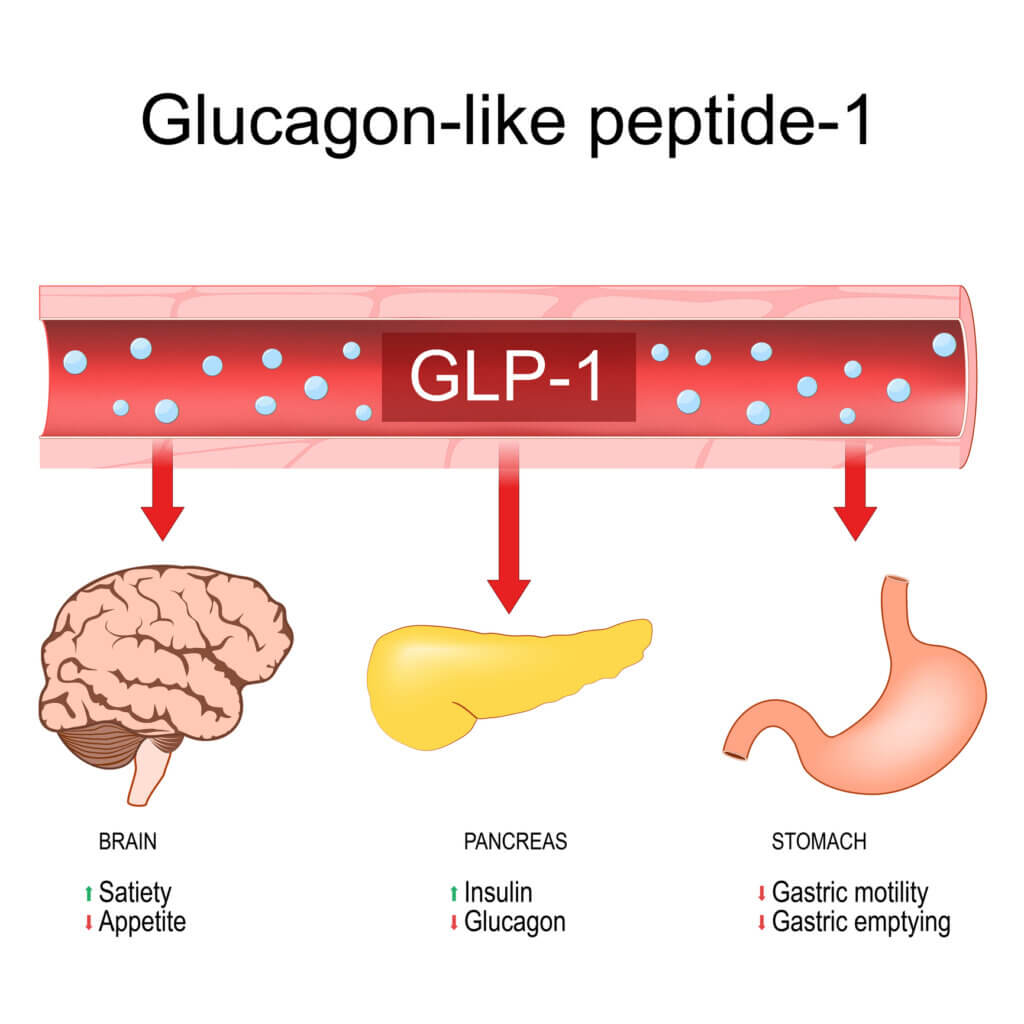Happy New Year 2024! For many, the new year often includes goals for weight loss, especially after a season filled with festive and social eating occasions.
Weight loss should always be viewed in the context of two goals: reducing weight to a healthy and comfortable level and sustaining that goal over time. Weight loss can be achieved through various means, with most people having a plethora of options ranging from surgery and medications to different weight loss plans, supplements, and individualized coaching. The diet industry is booming, largely because most diets fail, leaving individuals feeling disillusioned and disappointed and often leading to introspection about why empty promises did not deliver sustained desired outcomes.

Weight Management Medications Offer Promise
During 2023, with much publicity, the pharmaceutical industry began offering newer, effective weight loss medications that work on GLP-1 (glucagon-like peptide-1) hormone receptors, such as Wegovy or Ozempic, as well as glucose-dependent insulinotropic polypeptide (GIP) hormone receptors, such as Zepbound or Mounjaro. These medications are highly effective in slowing down the absorption of food to make one feel fuller and even affect the reward pathway in the brain, helping to reduce cravings for hyper-palatable foods (like cakes, cookies, chips, and fast foods), resulting in a significant reduction in calorie intake. Even though you eat less on these medications, your energy requirements generally remain the same, thus your body is incentivized to use stored energy from fat stores to meet daily energy needs. The effects are very significant, and research clearly shows that these medications truly support weight loss and also help manage blood sugar levels, and lower the risk of chronic health conditions such as heart disease.

Is There a Downside?
There are always pros and cons to medication management. This is also true for these medications, and it is worth conducting a cost-benefit analysis. So, what are the possible negatives? To begin with, it is important to know that GLP-1 is a gut peptide naturally produced in the body, usually stimulated by fiber in the diet as well as dietary protein intake. When taking these medications, one’s natural interest and appetite for fiber- and protein-rich foods can decrease, leading to a reduction in the intake of these important nutrients. The downside then is that the body’s need for protein goes unmet, and as a result, muscle is broken down to meet these needs. This means that without proper dietary attention, a significant percentage of the weight lost may be attributed to loss of muscle. Well-known physician Peter Attia reports in his clinic that Dexa scans have shown that 50% of the weight lost by some patients on these medications can be attributed to loss of muscle mass. This implies that for every 10 pounds of weight loss, 5 pounds may be fat and 5 pounds may be muscle. This is a significant observation as the loss of muscle means that one’s metabolic rate is also slowing down, and it also means that one is at risk for becoming “skinny fat” with a lower weight but still a high percentage of body fat.
Furthermore, without proper support, individuals on these medications tend to eat less overall. These medications do not inspire people to make better food choices or take additional steps to meet daily nutrient requirements. Without paying attention to what one eats and merely eating less overall, people on these medications also run the risk of malnutrition. When eating less overall, it means one consumes fewer nutrients too, which over time can result in a chronic inadequate supply of important nutrients that are needed. This can affect the body and overall health in many ways, especially if not addressed and corrected.
Another concern is that these medications seem to reduce one’s water intake, increasing the risk of dehydration. Dehydration has many negative effects, including feeling fatigued, having a rapid heart rate, low blood pressure, and it can be a contributor to the development of kidney stones.
Yet another concern is the gastrointestinal side effects of these medications, such as constipation, reflux, delayed emptying of stomach contents, and in some cases, bowel blockages.
Yes, These Medications Can Be Very Supportive Too!
These medications probably offer more promise for supporting weight loss than any other weight loss medication in history. However, given the long list of potential side effects, you may now be thinking that these medications are not an option. Nevertheless, for many people, they are a very useful tool to support weight loss goals and offer much promise for those suffering from obesity and multiple frustrated weight loss attempts. The most profound effect of these medications is their ability to reduce appetite and food cravings. If it is easier to control appetite, then it becomes easier to reduce how much you eat and consequently lose weight. The key lies in having a supportive plan to help you eat and live in such a way as to gain the benefits of the medications without experiencing the side effects.
To this end, it is extremely helpful to have a registered dietitian work with you when you are taking these medications. Dietitians can develop an eating plan that ensures an adequate intake of protein, fluids, and fiber, as well as meeting your micronutrient requirements within an expected reduced calorie intake associated with these medications. This means you can escape the undesirable side effects of losing muscle, a slowed metabolic rate, and malnutrition.
These medications are viewed as a useful tool to overcome significant inertia that would normally impede weight loss efforts. In addition, by creating individualized meal plans, dietitians are also able to support your gut health while on these medications by providing advice on suitable probiotics, fiber, and substrates that support your microbiome and help you avoid associated gastrointestinal side effects.
In short, these medications are not a complete solution to weight management problems, but they are a very helpful and supportive facilitator that will allow you to adopt and sustain healthy lifestyle changes that support attaining and maintaining a healthy weight and lifestyle, thereby lowering your risk for chronic health conditions such as obesity, diabetes, and heart disease.

Top Dietary & Lifestyle Advice When Using These Medications
When making use of these medications, consider the following dietary guidelines:
- Follow a Whole-Food Diet: This should include fruits, vegetables, and whole grains. Your dietitian can help you meet your daily fiber goals. On average, women should aim for 25 g of fiber daily, and men 38 g of fiber daily.
- Include Adequate Amounts of Protein Daily: Specific requirements will vary from person to person, but aim to include a source of protein at each meal, from sources such as fish, chicken, eggs, dairy products, tofu, or beans and legumes.
- Take a Good Daily Multivitamin: This will help cover basic micronutrient needs. Your dietitian can assist you in choosing one that is best for you, aiming to meet 100% of your daily requirements for most nutrients.
- Be Intentional with Your Water and Fluid Intake: Just because you don’t feel like drinking doesn’t mean you do not need to. Use a schedule, an app, or a tracking tool to ensure you are getting enough. Your dietitian can help with determining your requirements and supporting you in achieving your fluid goals.
- Maintain an Active Lifestyle: This includes regular physical activity, which is a certain way to maintain healthy muscle mass and mitigate the unwanted side effects of these medications, such as losing muscle and slowing your metabolic rate. Exercise helps support weight loss efforts, improves insulin sensitivity (which further aids in weight loss), and helps maintain much-needed skeletal muscle mass. Your dietitian can work with you to find strategies to support adequate amounts of physical activity as part of your daily routine and healthy lifestyle goals.
Comprehensive Support from Anne Till Nutrition Group
The dietitians at Anne Till Nutrition Group are highly experienced nutrition professionals who can help you navigate weight management effectively. We believe there is not a one-size-fits-all solution for people who wish to lose weight. Medication can certainly support this process, but it is not a solution on its own. We also understand that the nutrition component of anyone’s weight management journey needs to fit their individual preferences and needs, and we are here to work with you to create a plan that will work for you. In addition to nutrition and medication, we will support healthy lifestyle changes through wellness coaching related to exercise, behavior change, and meal planning strategies. Reach out to us, tell us your story, and we will meet you where you are.

P: (919) 990-1130
W: annetill.com
I: @annetillnutritiongroup
F: Anne Till Nutrition Group
Contact Us Here
Call Us Today: 919-990-1130





